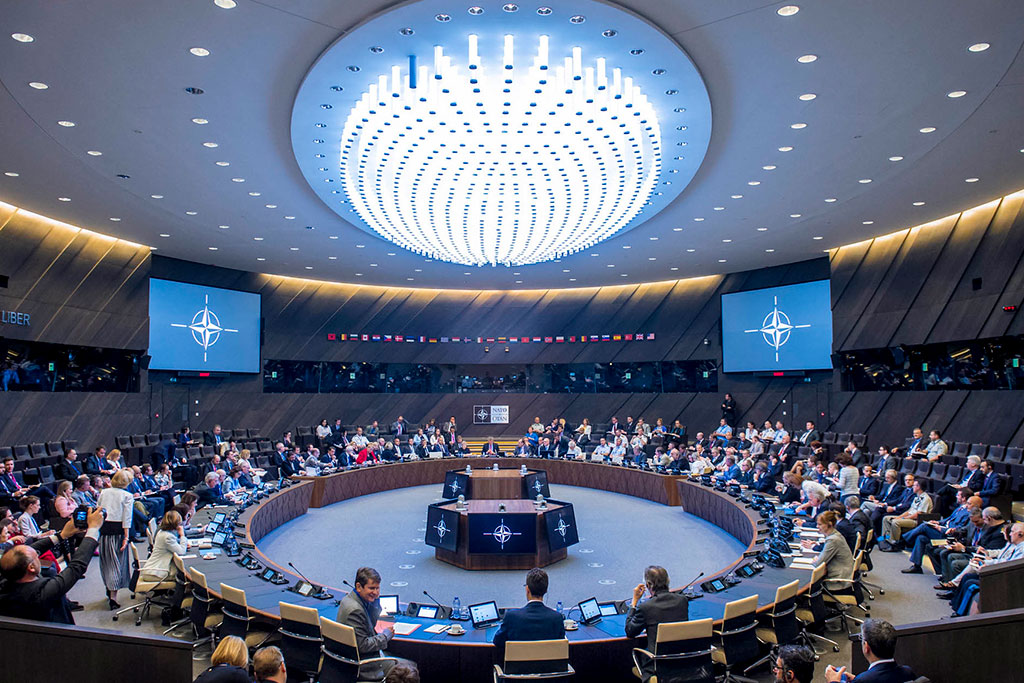
When Emmanuel Macron claimed in his declarations to The Economist that NATO was ‘brain dead’, he was essentially making the same observation as the child in the story, namely that the Emperor has no clothes. In operational terms, the North Atlantic Alliance has never had more military in its structures, nor has it been involved in more missions. Following a review of the threats it faces, it went so far last week as to add outer space to the domains covered by collective defence, the others being land, sea, air and cyberspace.
Politically, however, nobody knows where it is heading. It was the current US President, Donald Trump, who branded NATO as ‘obsolete’ in his election campaign and who, once in office, cast doubt on the validity of article 5 of the Washington Treaty, relating to collective defence, although he later backtracked. Now it is Macron who is questioning its credibility. When he talks about ‘brain death’, what the French President seems to mean is that the head, the political leadership, is not working. He is thinking about the US withdrawal from Syria, without consulting its allies, but also possibly the lack of political leadership in the Alliance. An instance of ‘brain death’ is that the summit being held on 3 and 4 December in London to celebrate NATO’s 70th anniversary has been described, at the insistence of the White House, as a ‘meeting of leaders’: the debates between them will be kept to a minimum –in terms of both time and content– and the entire final text has to be agreed in advance. Will the London summit refute Macron or vindicate him? At least his comments may serve as a much-needed wake-up call (and the same may be said in respect of Europe).
Macron seems to be addressing three audiences: the first is the French public, to position himself as the leader of Europe (and with Merkel on the way out, he is the only candidate). The second is Trump himself and a public and elite opinion in the US that tend to see the Alliance as more distant the further away they are from the Atlantic (paradoxically, those that most support NATO are white males on the East coast and in the mid-West, Trump’s heartland). And the third audience is Europe, where the message is that either the EU gets its act together or it faces the prospect of going down the drain.
But who is on his side? He has ruffled Merkel’s feathers in the run-up to the London summit, although the German Chancellor has come to terms with Macron’s rhetoric in other spheres and talks in turn of the need for Europe to seek and achieve ‘digital sovereignty’ in relation to Silicon Valley. Her Foreign Affairs Minister, more in line with Macron, has proposed a commission to give NATO political impetus. But this is to misunderstand the lack of political direction. Spain, at least the government-in-waiting, pursues a line of strategic autonomy for Europe, as does the European Commission and possibly Italy. But this is on condition that the autonomy does not run counter to NATO, which all sides want to retain. Even with good will and resources, the EU will take time to reach a par with NATO. Macron’s goal is not to compete with NATO but to ensure that the EU would be capable of acting independently of the Atlantic Alliance if the US stymied it or did not want to take part.
The US is not accustomed to Europe, the EU, using the language of power and geopolitics, as the new European Commission, which in theory is due to start work a few days prior to the transatlantic summit in London, is likely to do. Shortly after his interview in The Economist, in a speech at the Peace Forum in Paris, Macron spoke of Europe as a possible powerbroker between China and the US. This is going well beyond the search for a third way, and seems an ill-judged course, however much the US and Europe are unable to see eye-to-eye on everything regarding China. But nor can Europe be equidistant.
At the Wales summit of 2018, all the participants undertook to raise their defence spending to at least 2% of GDP within a decade to offset US expenditure. In fact, as the NATO Secretary General Jens Stoltenberg says, spending by the non-US allies has gone up in the past four years, and he proposes to present this result (trend?) to Trump in London. But it is relatively small: US$14.6 billion a year, or 5%. Stoltenberg adds that over the next two years members of NATO, excluding the US, will add US$100 billion to their defence budgets.
Settling on 2% (albeit with certain sub-targets built into it) is arbitrary, rather like the Maastricht criteria for the Monetary Union, although politics often requires these numerical simplifications. What NATO ought to do is think better about what it wants to be for and prioritise the capabilities that it needs –it is only doing this partly at the moment– and, in the light of the conclusions, establish spending objectives. A country such as Spain is below 1% (according to NATO’s own figures, although it would be more if, for example, the money spent on the Civil Guard were added), although it participates in all the EU’s and NATO’s military operations. But in Trump’s view (not that of the Pentagon or those who understand these matters), that does not count. He only looks at the spending figures, and it is likely that the current US President will again point an accusing finger at Spain in London.
Europe –possibly thanks to Trump and Brexit, which here have served more as a vaccine than a virus– is finally developing something of its own capability in defence. The European Defence Fund, which is primarily an industrial project, has a proposed budget of €13 billion between 2021 and 2027. Despite the fact that the US wants Europe to put more effort into its own defence, when it does so, the US complains it cannot take part (although in the end the EDF will be open to third-party countries). The 2% that Trump is now insisting on is, as he sees it, also for purchases of equipment (at least the 20% agreed in Wales), as long as it is made in America.
Even if the target is reaffirmed, the slowdown in the world and European economies will make it hard to meet. Whatever happens, we may owe a debt of gratitude to Macron if there is at least a dialogue, as opposed to a series of monologues, in London, at the heart of the most enduring alliance in history. It would be as well if it continued to endure, transforming itself in the process. With Trump or without him.


